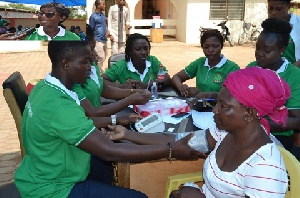 Ghanaians have been urged to take their health seriously (File Photo)
Ghanaians have been urged to take their health seriously (File Photo)
Dr Henry Nagai, a Public Health Physician, has called for the urgent need of the country’s health sector to focused on preventative and curative care simultaneously to reduce non-communicable diseases especially diabetes and hypertension.
He recommended that the move could be done in a number of strategies including medical outreach at various religious and social gatherings as well as screening relatives of patients who visit the hospital for medical care.
“Most of the non-communicable disease does not show major signs. Blood Pressure and diabetes have no noticeable symptoms until it gets to an escalating stage where the fellow get a mild stroke before it is detected,” he said.
Speaking at a symposium Accra on the theme “Double Burden; of Communicable and Non-Communicable diseases”, Dr Nagai suggested that various hospitals and public health workers needed to collaborate and work together towards reducing death through early detection.
It was organised by the University of Ghana Medical School Class of 1998 to mark their 20 years after medical school.
He said that one out of two people in the country was prone to have high blood pressure while between one and two persons out of 10 people were likely to have diabetes.
He appealed to traditional, opinion and religious leaders, as well as social event organisers, to include health screening in their activities to keep their people healthy.
Professor Agyeman Badu Akosa, former Director-General of the Ghana Health Service (GHS) in remarks reiterated the need for regular physical exercises in order to keep the body healthy.
He said non-communicable diseases such as hypertension and diabetes were steadily causing more deaths as a result of lack of regular exercises by many people.
Prof Akosa described the situation as alarming and stressed the need for Ghanaians to change their attitude and use part of their leisure to engage in exercises to keep the body strong.
Questioning why leaders and management of the country continued to seek medical healthcare outside the country, he said the trend showed the country had many problems in the health sector.
The Former Director-General of GHS said the country’s health sector was riddled with many challenges from inadequate personnel, tools, equipment, resources and drugs.
Due to the many challenges in the health sector, patients they now resort to prayer camps when they are sick and only visit the hospital when the situation worsened.
He urged Ghanaians to have a positive change of attitude and take their health seriously.